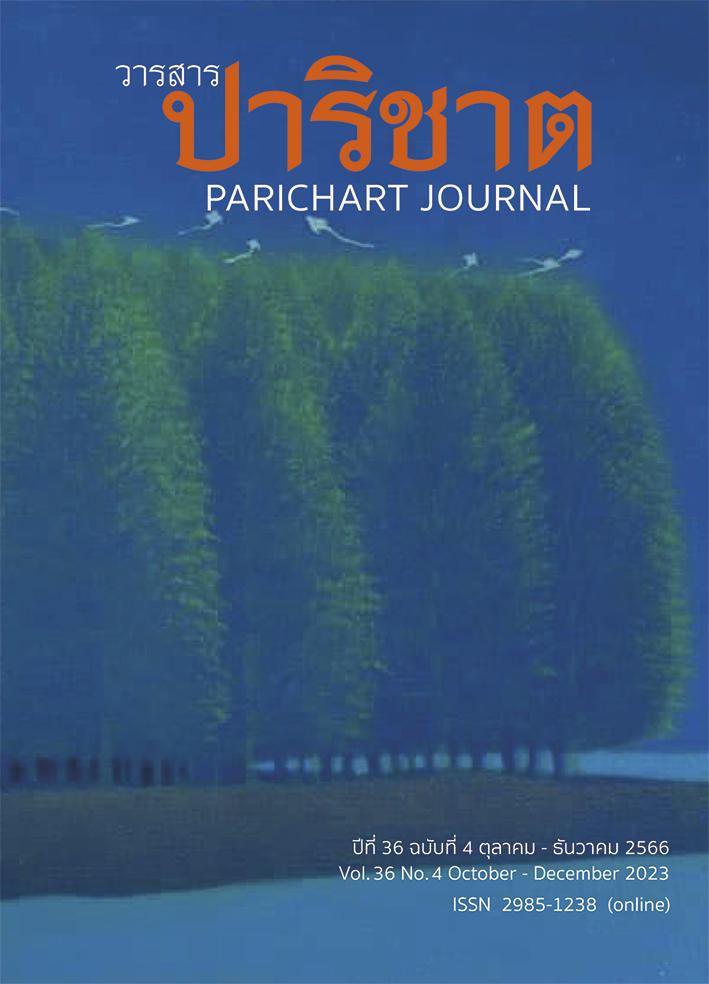Educational Ethnography in Music Classroom at Primary School Level
Main Article Content
Abstract
This academic research presents the framework on educational ethnography so as to be applied in examination of students’ behavior and learning environment that influence students’ music learning. The use of educational ethnography to assist and advance music education is considered to be useful since B.E. 2516. The majority of research on the subject of music education in Thailand has used the positivism paradigm and a quantitative research methodology for more than 50 years. While an educational ethnography is not commonly preferred, it is utilized to reflect on factual concerns in classrooms, particularly when using deductive approaches. With a focus on subgroup scales in social culture, this paper aims to promote educational ethnography as a method for study. The interaction of social members, behaviors, and social values in primary school children's learning practices is essential to ethnographic educational research. In a study that uses qualitative research design and methodological perspective to the success of learning management, educational ethnography might also be optional.
Article Details

This work is licensed under a Creative Commons Attribution-NonCommercial-NoDerivatives 4.0 International License.
References
Chiengchana, N. (2007). Synthesis of research in music education: Meta-analysis content analysis [Unpublished master’s thesis]. Chulalongkorn University. (in Thai)
Pumin, P. (2014). An analytical study of music education research in Thailand during 2002-2011 [Unpublished doctoral dissertation]. Mahidol University. (in Thai)
Suttachitt, N., Chiengchana, N., & Treemas, C. (2018). The development of training modules for elementary music teacher, grades 4-6 on teaching music based on Kodaly principles and brain-based learning theory. Journal of Fine and Applied Arts, Khon Kaen University, 10(2), 276-294. (in Thai)
Trachoo, K., Chuangprakhon, S., & Lohamart, C. (2021). The development of musical learning activities based on Dalcroze structural model for Prathomsuksa 4 students. Journal of Humanities and Social Science, Mahasarakham University, 40(4), 7-18. (in Thai)
Tongnam, Y., & Suttachitt, N. (2019). The transmission processes in Tro performance by Thongchai Samee. Institute of Culture and Arts Journal Srinakharinwirot University, 40(4), 7-18. (in Thai)
Udtaisuk, D. (2018). Analysis of factors affecting achievement in music enculturation from Kru Surang Duriyapan (Thai national artist), who made a major contribution to Thai vocal Music. Journal of Education Studies, Chulalongkorn University, 46(4), 168-187. (in Thai)
Huncharoen, G. (2018). Teaching module on listening skills applied from Orff, Kodaly and Dalcroze methods for grade 1 students. Journal of Fine and Applied Arts, Khon Kaen University, 10(1), 60-90. (in Thai)
Sastra, U., Triwaranyu, C., & Chuppunnarat, Y. (2019). An instructional process for promoting ability in Thai musical creativity for lower secondary students: Lesson learned from the National Artist in Performing Art (Thai Music). Journal of Education Studies, Chulalongkorn University, 47(2), 544-568. (in Thai)
Chuppunnarat, Y., Laovanich, V., & Laovanich, M. (2018). The status and approach of music education resource management in Thailand’s institutions: Ministry of Culture’s policy formulation and implementation. Ministry of Culture. (in Thai)
Bloome, D. (2011). Classroom ethnography. In M. Grenfell, D. Bloome, C. Hardy, K. Pahl, J. Rowsell & B.V. Street (Eds.), Language, ethnography, and education: Bridging new literacy studies and Bourdieu (pp. 6-25). New York: Routledge. https://doi.org/10.4324/9780203836057-2
Phothisita, C. (2009). Sciences and arts of qualitative research (5th ed.). Amarin Printing. (in Thai)
Sirisri, A. (1988). The using of ethnographical methodologies in educational research. Journal of Research Methodology, 3(2), 19-29. (in Thai)
Geertz, C. (1973). The interpretation of culture. Basic Books.
Masemann, V. L. (1982). Critical ethnography in the study of comparative education. Comparative Education Review, 26(1), 1-15.
Erickson, F. (2010). Classroom ethnography. International Encyclopedia of Education, 320-325.
Janthawanich, S. (2016). Qualitative research methodologies (23rd ed.). Chulalongkorn University Press. (in Thai)
Zimmerman, J. R. (1982). The musical experiences of two groups of children in one elementary school: An ethnographic study [Unpublished doctoral dissertation]. The Ohio State University, Columbus.
Krueger, P. J. (1987). Ethnographic research methodology in music education. Journal of Research in Music Education, 35(2), 69-77.
Victor, E. (2014). I did that wrong and it sounded good: An ethnographical study of Vernacular music making in higher education [Unpublished doctoral dissertation]. University of South Florida.
Emily, T.S. (2011). Our musical school: Ethnographic methods and culturally relevant pedagogy in elementary general music [Unpublished master’s thesis]. University of Maryland.
Holzer, M.F. (2007). Aesthetic education, inquiry and the imagination. Lincoln Center Institute for the Arts in Education.
Miles, M. B., & Hubermand, A. M. (1994). Qualitative data analysis (2nd edition). SAGE.
Davis, R. B., & Maher, C. A. (1990). What do we do when we do mathematics? In R. B. Davis, C. A. Maher & N. Noddings (Eds.), Constructivist views on the teaching and learning of mathematics. Journal for Research in Mathematics Education Monograph (4th ed.). (pp. 65-78). Reston: National Council of Teachers of Mathematics.
Maher, C. A. (2005). How students structure their investigations and learn mathematics: Insights from a long-term study. The Journal of Mathematical Behavior, 24(1), 1-14.


